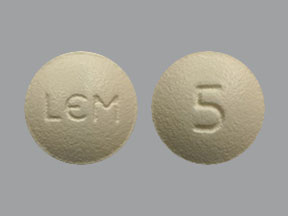Lemborexant and Alcohol/Food Interactions
There are 3 alcohol/food/lifestyle interactions with lemborexant.
Alcohol (Ethanol) Lemborexant
Major Drug Interaction
Using lemborexant together with ethanol (alcohol) may increase side effects such as dizziness, drowsiness, confusion, and difficulty concentrating. Some people may also experience impairment in thinking, judgment, and motor coordination. You should avoid the use of alcohol while being treated with lemborexant. Do not use more than the recommended dose of lemborexant, and avoid driving, operating machinery, or engaging in potentially hazardous activities requiring mental alertness and motor coordination until you know how the medication affects you. Talk to your doctor if you have any questions or concerns. It is important to tell your doctor about all other medications you use, including vitamins and herbs. Do not stop using any medications without first talking to your doctor.
Nicotine Lemborexant
Moderate Drug Interaction
Lemborexant may reduce the blood levels of nicotine, which may make the medication less effective in treating your condition. Talk to your doctor if you have any questions or concerns. Your doctor may be able to prescribe alternatives that do not interact, or you may need a dose adjustment or more frequent monitoring to safely use both medications. It is important to tell your doctor about all other medications you use, including vitamins and herbs. Do not stop using any medication without first talking to your doctor.
Lemborexant Food/Lifestyle
Major Food Interaction
Do not consume grapefruit, grapefruit juice, or any supplements that contain grapefruit extract during treatment with lemborexant unless directed otherwise by your doctor. Grapefruit juice can increase the blood levels of lemborexant. This may increase the risk of side effects such as central nervous system depression, abnormal sleep behaviors, worsening of depression or suicidal thoughts, changes in heartbeat, or headache. Talk to your doctor if you have any questions or concerns. It is important to tell your doctor about all other medications you use, including vitamins and herbs. Do not stop using any medications without first talking to your doctor.
Switch to professional interaction data
Lemborexant drug interactions
There are 470 drug interactions with lemborexant.
Lemborexant disease interactions
There are 4 disease interactions with lemborexant which include:
More about lemborexant
- lemborexant consumer information
- Check interactions
- Compare alternatives
- Reviews (311)
- Side effects
- Dosage information
- During pregnancy
- Drug class: miscellaneous anxiolytics, sedatives and hypnotics
- Breastfeeding
- En español
Related treatment guides
Drug Interaction Classification
| Highly clinically significant. Avoid combinations; the risk of the interaction outweighs the benefit. | |
| Moderately clinically significant. Usually avoid combinations; use it only under special circumstances. | |
| Minimally clinically significant. Minimize risk; assess risk and consider an alternative drug, take steps to circumvent the interaction risk and/or institute a monitoring plan. | |
| No interaction information available. |
See also:
Further information
Always consult your healthcare provider to ensure the information displayed on this page applies to your personal circumstances.


